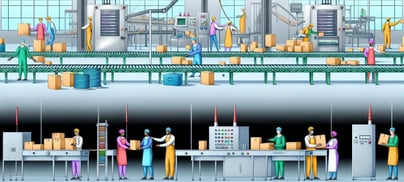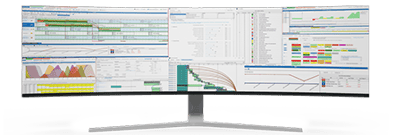Manufacturing Stability with AI-Powered Scheduling
Achieving process stability is essential for packaging facilities. As an Operations Director, you understand the challenges of maintaining efficiency, meeting customer demands, and optimizing resources. Traditional scheduling methods often fall short in providing the agility and precision required in today's dynamic environment.
However, with the advent of AI-powered scheduling, a new era of manufacturing optimization has dawned, promising enhanced stability and productivity.

The Need for Stability in Packaging Manufacturing
Packaging manufacturing is a complex process involving various stages from design to distribution. Any disruption in the production schedule can ripple through the entire supply chain, leading to delays, increased costs, and unhappy customers. Maintaining stability is not just about meeting deadlines; it's about ensuring consistent quality, minimizing downtime, and maximizing resource utilization.
Enter AI-Powered Scheduling
AI-powered scheduling solutions, such as those offered by PlanetTogether, have emerged as a game-changer for packaging facilities seeking to enhance process stability. By leveraging advanced algorithms, machine learning, and real-time data integration, these systems can optimize production schedules with unprecedented accuracy and efficiency.


Integration with ERP, SCM, and MES Systems
The seamless integration of AI-powered scheduling solutions with ERP (Enterprise Resource Planning), SCM (Supply Chain Management), and MES (Manufacturing Execution Systems) platforms is crucial for unlocking their full potential. Companies utilizing systems such as SAP, Oracle, Microsoft Dynamics, Kinaxis, Aveva, and others can harness the power of AI-driven insights to streamline operations across the entire value chain.
Benefits of Integration
- Real-Time Visibility: Integration allows for the seamless exchange of data between different systems, providing stakeholders with real-time visibility into production processes, inventory levels, and resource utilization.
- Predictive Analytics: By analyzing historical data and current trends, AI-powered scheduling systems can forecast demand, identify potential bottlenecks, and recommend optimal production schedules, enabling proactive decision-making.
- Enhanced Collaboration: Integration fosters collaboration between departments by aligning production schedules with procurement, inventory management, and customer demand forecasts. This ensures better coordination and synchronization across the entire supply chain.
- Adaptive Planning: AI-driven scheduling solutions can dynamically adjust production schedules in response to changing conditions, such as machine breakdowns, rush orders, or supply chain disruptions, minimizing disruptions and maximizing throughput.
- Continuous Improvement: By capturing and analyzing vast amounts of operational data, integrated systems facilitate continuous improvement initiatives, allowing companies to identify inefficiencies, optimize workflows, and drive overall performance.

Transforming Packaging Operations with AI-Powered Scheduling
By implementing an AI-powered scheduling solution integrated with their existing ERP, SCM, and MES systems, the facility was able to achieve remarkable results:
- Reduced Downtime: Predictive maintenance algorithms helped identify potential equipment failures before they occurred, reducing unplanned downtime and maintenance costs.
- Improved On-Time Delivery: AI-driven scheduling algorithms optimized production schedules based on real-time demand forecasts and resource availability, ensuring on-time delivery of orders.
- Enhanced Resource Utilization: Real-time data integration enabled better coordination between production, procurement, and inventory management, leading to optimal utilization of resources and reduction in waste.
- Increased Customer Satisfaction: By improving process stability and responsiveness, the facility was able to meet customer demands more effectively, leading to higher satisfaction levels and repeat business.
AI-powered scheduling represents a paradigm shift in the way packaging facilities manage their operations. By harnessing the power of artificial intelligence, companies can achieve unprecedented levels of process stability, efficiency, and customer satisfaction.
The integration of AI-driven scheduling solutions, such as those offered by PlanetTogether, with ERP, SCM, and MES systems is essential for unlocking their full potential and driving sustainable growth in the competitive manufacturing landscape.
As an Operations Director, embracing this transformative technology is not just a choice but a necessity for staying ahead of the curve and thriving in the digital age. Are you ready to take your manufacturing operations to the next level? Contact us today to learn more about how PlanetTogether can help you achieve your goals and drive success in your industry.


